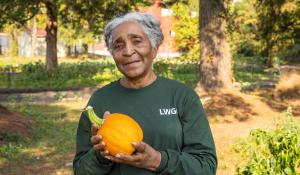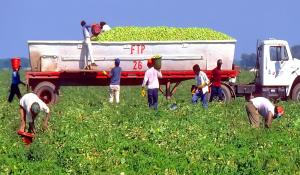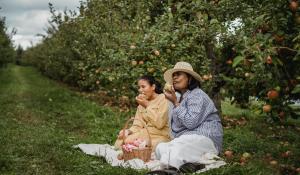
There are Climate Victory Gardens in the Midwest doing inspiring work—fighting for food equity in Minnesota. When you read the name of the organization running these gardens, Project Sweetie Pie (PSP), its founder, Michael Chaney, wants to evoke the feeling of an elder lovingly calling you “sweetie pie,” who wishes for and sees the best in you.
Chaney sees the best in you, too. He wants the best for you. That’s why, in 2010, he started the food justice organization in Minneapolis, viewing the act of nourishing our bodies with not only healthy foods, but education and justice, as crucial to our collective survival and wellbeing.
PSP works on several levels, from spearheading the distribution of fresh produce to the communities of the Northside neighborhood to mentoring and empowering students of North Community High School by teaching entrepreneurial and agricultural skills. It is also a partner of Green America’s Climate Victory Gardens program (ClimateVictoryGardens.org).
“I’m an activist, first and foremost,” Chaney says. “I’m simply using agriculture as one of the tools of my trade to curate a greener, prosperous future.”
The Minneapolis Community Today
Chaney understands all eyes are on Minnesota. “After the murder of George Floyd, how do we come back from that?” he asks.
Minneapolis is a city of vibrant communities, resilience, and, like everywhere in the United States, also has injustice and contradictions. All around him, Chaney saw people struggling to live bountiful lives in what was supposed to be a country where anyone could be or do anything.
Black residents make up 18.4% of Minneapolis’ population, but account for a quarter of all food-insecure households in the city. Latino and Indigenous households experiencing food insecurity are also overrepresented.
“Low-income communities are placeholders, commodities seen as disposable when wealthy developers are ready to gentrify a neighborhood,” Chaney says, not mincing words. Tossing these communities aside is what leads to things like food scarcity, he explains. Living on the underserved margins, residents lose access to education, tools, and resources.
Using PSP as the base of operations, Chaney wants to disrupt this pattern and re-invest in people. He grew up in Wisconsin on a 160-acre family farm in the 1950s. He recalls his peers being able to pursue trades like mechanics, carpentry, and home economics. When funding is cut to trade schools and programs, people are left “hung out to dry,” Chaney laments.
Chaney moved to Minnesota to attend the University of Minnesota, where his activism in the state began. In 1984, he co-founded the Minneapolis Juneteenth Celebration, and a decade later, he co-founded the Wendell Phillips Community Development Federal Credit Union. This credit union was created to fill the need for a financial institution controlled by members and serves primarily communities of color; in 2001, it merged to become the City-County Federal Credit Union.
“By marginalizing people, by dismissing people, by not allowing people to become their best selves, by not investing in communities, we really are unraveling the American dream,” Chaney says.
Giving Resources to Those Who Need Them
“Community isn’t just happenstance,” Chaney insists. “It’s a lifestyle where we as individuals must help support the collective.”
That’s why the work of PSP touches on many aspects but is centered around one idea: restoring the commons.
One of Chaney’s proudest achievements in his efforts to better the community was helping advocate for and pass Minnesota’s first urban farming legislation. Authored by Rep. Karen Clark (D), the 2015 bill distributed $6 million in funding for urban agriculture, including PSP, specifically in low-income communities made up of predominantly Black and Indigenous people.
“One of the things we found out during the pandemic, is that resources weren’t as rigid as we thought,” Chaney explains. “There were funds and resources available to help remedy hunger, unemployment, medical aid. Until these artificial restrictions imposed on us by the rich and the powerful [end], we’re not ending poverty, we’re perpetuating it. Poverty is slavery, and if we really want to have an abundant society, we must invest in the residents of our communities.”
I'm an activist, first and foremost. I'm simply using agriculture as one of the tools of my trade to curate a greener, prosperous future.
—Michael Chaney, Project Sweetie Pie
Food Equity Is the Next Stage of Civil Rights
Growing one’s own food generates a plethora of benefits, from nutrition to combatting climate change, and taking back agency over what you consume and the land you live on.
“The local food movement is the latest iteration of the Civil Rights movement,” Chaney says. “It’s addressing equity—you’ll know what equity looks like when you see [local and culturally relevant] food sitting not just in specialty stores, but also in big box stores, that is truly reflective of the cultural diversity in our community. We’re democratizing agriculture.”
Chaney doesn’t care what people decide to grow, just that they grow.
“This is a long climb, and we must tell our story,” he says. “We must fight for our self-sufficiency and our future. Health, well-being, and justice is what we’re growing as much as a tomato on a vine.”
The Minneapolis Community of Tomorrow
One of the most astonishing things about PSP is its focus on longevity. Several of its programs were created to invest in a future Minneapolis, one that Chaney hopes will long outlast him.
Step Up pairs Minneapolis youth with Twin Cities employers through internships and training to help them build careers and lead to a diverse and skilled workforce. Since 2003, Step Up has implemented nearly 30,000 high-quality internship opportunities.
Another program, Northside Safety-N.E.T. (Neighborhoods Empowering Teens), uses resources to train young people on civic engagement through environmental and community lenses.
“I daresay that we are building a legacy,” he says hopefully. “We are harnessing the food of our ancestors and now it’s our turn as stewards to feed and care for families in the future.”







